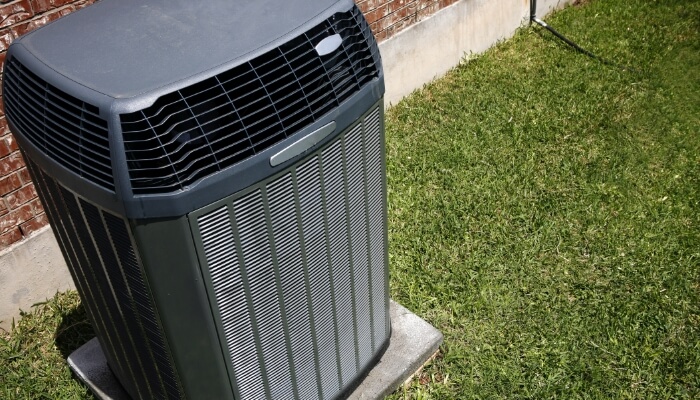Home Heat Pump Repair and Replacement Near Champaign, IL
Whether you're considering installing a heat pump for your Champaign, IL, area home, or need help repairing your current unit, the pros at Lanz, Inc. are here to help! Our team of manufacturer-trained heat pump specialists is ready to deliver upgraded indoor comfort all winter long. We don't believe in cookie-cutter solutions, so when it's time to replace your heat pump, we'll help you find the right fit for your unique needs. We can't wait to help you make the most of your home heating. Give us a call today at 217-394-1380 to get started!

The absence of heat from your heat pump is the first indication that it may need to be repaired. This can be the result of an unclean air filter, a clogged unit, or a malfunctioning reversing valve. If replacing the air filter doesn't fix the problem, you might have to hire a specialist. For instance, low refrigerant levels are a very common problem that can be checked and topped off by a qualified HVAC specialist. The same issues that cause your heat pump to not heat—a broken reversing valve or low refrigerant levels—also typically cause it to not cool. But thermostat problems could also be to blame. An additional sign of a broken heat pump is continuous running. A malfunctioning thermostat or a damaged compressor contractor may be the cause of the non-stop running. Lastly, if you notice unusual sounds or weird smells, these could be signs of leaks, loose parts, or other issues that need to be professionally inspected and possibly fixed.
Why Buy an Energy-Efficient Heat Pump?
If you use electricity to heat your home, consider installing an energy-efficient heat pump system. Heat pumps are the most efficient form of electric heating in mild and moderate climates, providing two to three times more heating than the equivalent amount of energy they consume in electricity. A heat pump can save as much as 30% to 40% of the electricity you use for heating.
Air source heat pumps are recommended for mild and moderate climate regions, where the winter temperatures usually remain above 30°F. Ground source (also known as geothermal) heat pumps are more efficient and economical to operate when compared to conventional air source heat pumps, especially in climates with similar heating and cooling loads.
About Heat Pump Efficiency
Three types of heat pumps are typically available for residences: air-to-air, water source, and ground source. Heat pumps collect heat from the air, water, or ground outside your home and concentrate it for use inside. Heat pumps operate in reverse to cool your home by collecting the heat inside your house and effectively pumping it outside.
Heat pumps have both heating and cooling ratings-both in terms of capacity and efficiency. Capacity ratings are generally in British thermal units (Btu) per hour or tons (one ton equals 12,000 Btu/hr). Heating efficiency for air source heat pumps is indicated by the heating season performance factor (HSPF). The HSPF tells you the ratio of the seasonal heating output in BTUs divided by the seasonal power consumption in Watt-hours.
A heat pump can supply 2 to 3 times as much heat as it consumes in electricity because it moves energy from outside to inside (or vice versa). Heat pump efficiency varies with outdoor temperature. The performance of an air source heat pump in heating mode decreases with the drop in outside air temperature. The actual seasonal efficiency (as opposed to the rating) is, therefore, higher in a mild climate than in a severe cold climate.
In the cooling mode, a heat pump operates exactly like a central air conditioner. The seasonal energy efficiency ratio (SEER) is analogous to the HSPF but tells you the seasonal cooling performance.
Tips for Buying a New Heat Pump
- Heat pumps must be sized and installed properlyto work efficiently. Heat pumps are sized for either the heating demand or cooling demand, depending on which implies the larger unit (almost always cooling). However, heat pumps do not perform well over extended periods of sub-freezing temperature and it may not be cost-effective to meet all your heating needs with an air-source heat pump.
- Ground-source heat pumps (GSHPs)are more efficient and less noisythan air-source heat pumps. Though GSHPs are more expensive to install, the dramatic improvement in efficiency can yield attractive life cycle cost savings. However, the appropriateness of a GSHP depends on the size of your lot, the conditions of the subsoil and landscape, and sometimes the relative magnitudes of summer cooling and winter heating requirements.
- Select a heat pump with a higher HSPF. For units with comparable HSPF ratings, check their steady-state rating at -8.3°C, the low-temperature setting. The unit with the higher rating will be more efficient. Select a heat pump with a demand-defrost control. This will minimize the defrost cycles thereby reducing supplementary and heat pump energy use.
- Select a heat pump with an outdoor sound rating of 7.6 decibels or lower. The lower the value, the less noisy the outdoor unit.
- Ductwork may need to be enlarged in some cases. If installing a new heat pump in a home without an existing heat pump or air conditioner, ductwork may need to be enlarged. Heat pump systems generally require larger duct sizes than other central heating systems. For proper heat pump operation, air flow should be 50 to 60 liters per second per kilowatt-hour or 400 to 500 cubic feet per minute per ton of cooling capacity.
- If a heat pump is added to an electric furnace, the heat pump coil can usually be placed on the cold (upstream) side of the furnace for the greatest efficiency.
- Fans and compressorsmake noise. Locate the outdoor unit away from windows and adjacent buildings. Some units also make noise when they vibrate. You can reduce this noise by selecting quiet equipment or by mounting the unit on a noise-absorbing base.
Advanced Features to Look for in a Heat Pump
A number of relatively new innovations are improving the performance of heat pumps.
- Unlike standard compressors that can only operate at full capacity, two-speed compressors allow heat pumps to operate close to the heating or cooling capacity that is needed at any particular moment. This saves large amounts of electrical energy and reduces compressor wear. Two-speed heat pumps also work well with zone control systems.
- Some models of heat pumps are equipped with variable-speed or dual-speed motors on their indoor fans (blowers), outdoor fans, or both. The variable-speed controls for these fans attempt to keep the air moving at a comfortable velocity, minimizing cool drafts and maximizing electrical savings. It also minimizes the noise from the blower running at full speed.
- Many high-efficiency heat pumps are equipped with a desuperheater, which recovers waste heat from the heat pump’s cooling mode and uses it to heat water. A desuperheater-equipped heat pump can heat water 2 to 3 times more efficiently than an ordinary electric water heater.
- The scroll compressor consists of two spiral-shaped scrolls. One remains stationary, while the other orbits around it, compressing the refrigerant by forcing it into increasingly smaller areas. Compared to the typical piston compressors, scroll compressors have a longer operating life and are quieter. According to some reports, heat pumps with scroll compressors provide 10°–15°F (5.6°–8.3°C) warmer air when in the heating mode, compared to existing heat pumps with piston compressors.
- Although most heat pumps use electric resistance heaters as a backup for cold weather, heat pumps can also be equipped with burners to supplement the heat pump. Back-up burners help solve the problem of the heat pump delivering relatively cool air during cold weather and reducing its use of electricity. Since there are few heat pump manufacturers that incorporate both types of heat supply in one box, these configurations are often two smaller, side-by-side, standard systems sharing the same ductwork. The combustion fuel half of the system could be propane, natural gas, oil, or even coal and wood. In comparison with a combustion fuel-fired furnace or standard heat pump alone, this type of system is also economical. Actual energy savings depend on the relative costs of the combustion fuel relative to electricity.
Tips for Lowering Your Heat Pump’s Energy Usage
- Do not manually set back a heat pump’s thermostatat night. Without a thermostat specifically designed for heat pump set-back, the electric resistance backup heat will engage when the thermostat is raised in the morning, resulting in much higher energy consumption.
- Clean or change filtersonce a month or as needed, and maintain the system according to the manufacturer’s instructions. Filter and coil maintenance have a dramatic impact on system performance and service life. Dirty filters, coils, and fans reduce airflow through the system. Reduced airflow decreases system performance and can lead to compressor damage if it continues for an extended period.
- Clean and lubricate the fan motor annually to ensure the required airflow is provided for proper operation. The fan speed should be checked at the same time. Incorrect pulley settings, loose fan belts, or incorrect motor speeds can all contribute to poor performance.
- Outdoor units should be protected from high winds. High winds may reduce efficiency by causing defrost problems. However, outdoor units should not be placed in restricted areas that will result in re-circulation of air over the coil.
Operating and Maintaining Your Heat Pump
Proper operation of your heat pump will save energy. Like all heating and cooling systems, proper maintenance is key to efficient operation. The difference between the energy consumption of a well-maintained heat pump and a severely neglected one ranges from 10%–25%.
You should also have a professional technician service your heat pump at least every year to:
- Inspect ducts, filters, blower, and indoor coil for dirt and other obstructions.
- Diagnose and seal duct leakage.
- Verify adequate airflow by measurement.
- Verify correct refrigerant charge by measurement.
- Check for refrigerant leaks.
- Inspect electric terminals, and if necessary, clean and tighten connections, and apply non-conductive coating.
- Lubricate motors, and inspect belts for tightness and wear.
- Verify correct electric control, making sure that heating is locked out when the thermostat calls for cooling and vice versa.
- Verify correct thermostat operation.
Our technicians will ensure your heat pump is properly maintained for optimal performance and lasting results. Give us a call today at 217-394-1380 to schedule your heat pump service!





